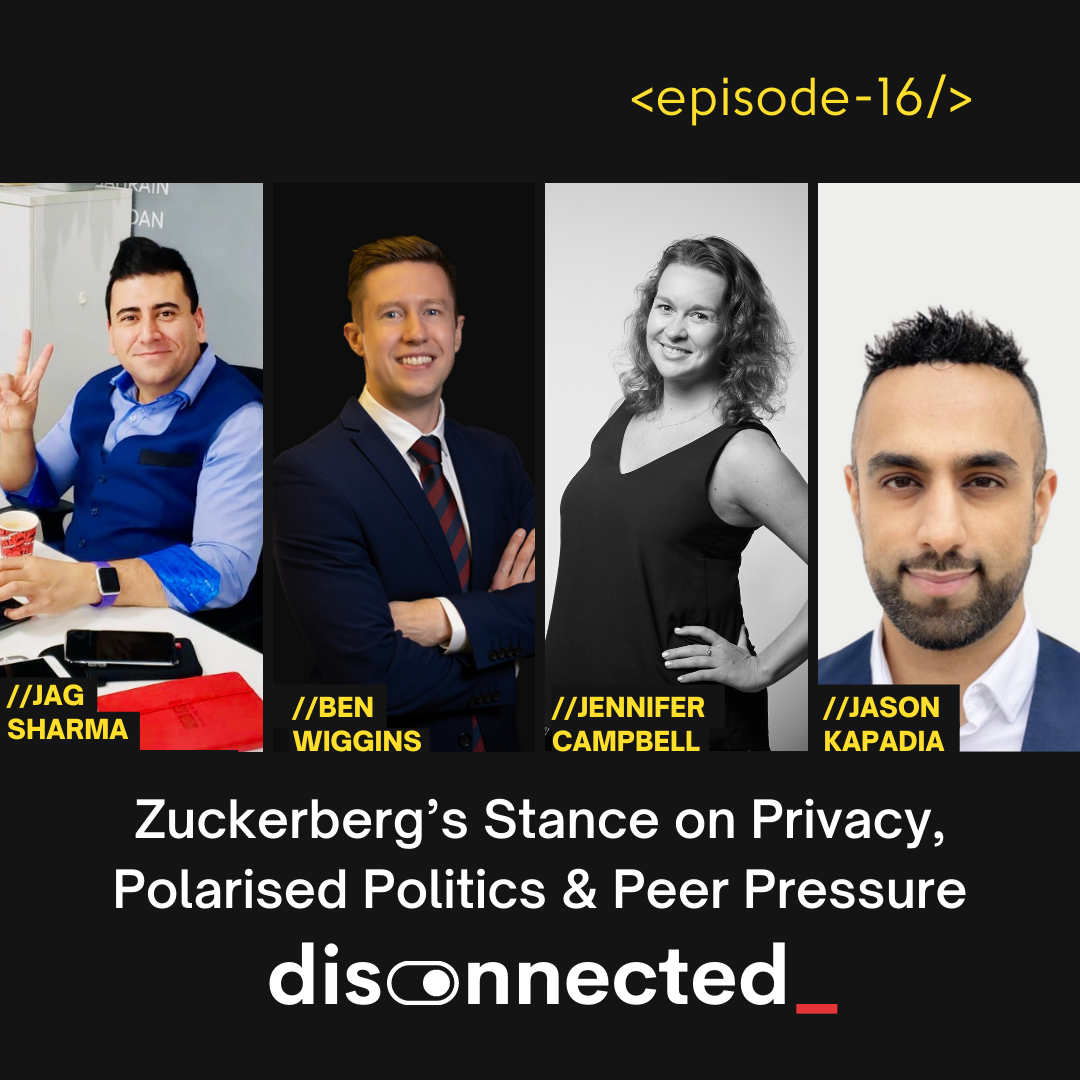Zuckerberg’s Stance on Privacy, Polarised Politics & Peer Pressure with Jason Kapadia, Jen Campbell & Ben Wiggins - Episode 16
Facebook forms part of our digital past and is a titan at present - do they have their future figured out, and how will their actions affect us…?
Hot off the back of a lengthy and revealing interview with Lex Fridman, Mark Zuckerberg’s next moves with Meta, Facebook, and the Metaverse hold immense power over the internet going forward.
For this week’s discussion on privacy, peer pressure and putting tech to humanitarian use, I’m joined once again by my panel of lovely co-hosts, with a substitution this week in Felina’s absence - a friend of the show returning from E2: Mobicia Founder & Developer, Jason Kapadia.
This episode of Disconnected covers:
Our highlights from Mark Zuckerberg’s recent interview with Lex Fridman
Facebook’s whistleblower, and her damning findings on the impact of Instagram on teens
The future of security, fraud and harassment in the Metaverse
How tech has been used for good in support of Ukraine
Whether we’re seeing more polarisation now than we did before the proliferation of social media
Episode Highlights:
“Zuckerberg makes a point saying that even subscription based business models suffer from the same inherent problems as ads-based models do. News organisations aren't always incentivized to post content that is centrist or well balanced, but rather polarising and partisan, because then they get more subscribers.” - 8:00 - Jason Kapadia
“I don't necessarily think that the platforms are necessarily the main issue, I think human behaviour has always been like that and it's about who shouts loudest, but I still think that the platform needs to take responsibility for being the megaphone. ” - 10:35 - Ben Wiggins
“Subscription services don't create democratised environments. They’re at the mercy of the subscribers, and leave the people that are on the fringes, or the people that can't even afford those services out.” - 16:45 - Jag Sharma
“There now seems to be a limitless number of new sources online, and many spitting, ‘alternate facts’ I guess. With that, we're in a situation where sensationalist stories rise to the top. We have to ask ourselves again, is that Facebook's fault? Or is it just the nature of this amazing internet which we've been blessed with, where anyone could be a publisher of news?” - 22:25 - Jason Kapadia
“The problem with Facebook is I don't really understand what their values are. So then what do you measure that against? What is okay on our platforms and what is not okay? Obviously, they're trying to drive community and drive freedom of speech, and all that kind of stuff. But I don't think they know where to draw the line, because they haven’t actually drawn it.” - 36:45 - Ben Wiggins
“Facebook is a company and, as much money as they make, they have a tonne of people working for them around the world. They can't keep the lights on on absolutely everything that they dream to do all the time, and they have shareholders. Their share prices dipped because the user base has dipped. So they are just a company that tries to satisfy their shareholders, but also keep as much of their mission as they can.” - 44:45 - Jag Sharma
“I'm interested to see what you think about security in the metaverse. Do we need to get in now whilst the metaverse, whatever definition you have of it, is still young, and we can learn from the mistakes of social media that have plagued our digital environment for the last 15 years? Does it matter? Should it be a decentralised format of security where every platform takes care of itself?” - 53:00 - Ben Wiggins
“What’s the metaverse being used for? I think that was actually asked to Zuckerberg at the beginning of the interview, and he tried to say that they use work rooms at the moment, and they have avatars and the rest of it. But there’s still no clarity on what they think we're going to use the metaverse for. If they don't even know how we're going to use it, or what they're going to use it for, how do they know what security needs to be in place?” - 1:03:20 - Jen Campbell
“We have to be thankful for social media. It seems like the Ukrainians have galvanised the world around them using Twitter and showing the world what's really going on. 20-30 years back, the narrative could have been written by the victors, not necessarily by what's actually happening on the ground.” - 1:08:05 - Jason Kapadia
Links & references:
Ben Wiggins:
https://www.linkedin.com/in/bewiggins/
Jason Kapadia:
https://www.linkedin.com/in/jasonkapadia/
https://www.instagram.com/jasonkapadia/
Jen Campbell:
https://www.linkedin.com/in/jennifer-m-campbell/
Jag Sharma:
https://www.linkedin.com/in/jagsharma
https://www.instagram.com/jagsharma/
Mark Zuckerberg interview Feb 2022
Tech for Good: Ukraine
https://edition.cnn.com/travel/amp/ukraine-airbnb-donations-cec/index.html
https://www.buzzfeed.com/amphtml/sydrobinson1/ukraine-digital-art-support


